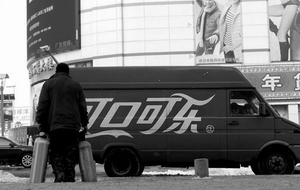 According to the company, the recycled plastic, or PET, bottles now going to be used will be the first to be made partially from plants, in this case, sugarcane waste.
According to the company, the recycled plastic, or PET, bottles now going to be used will be the first to be made partially from plants, in this case, sugarcane waste.Existing PET (or polyethylene terephthalate) bottles are made from non-renewable petroleum, but the new PlantBottle to be used in China has been created from one of the key ingredients from sugarcane for PET plastic, called monoethylene glycol, which represents 30 percent of the total composition of PET plastic by weight.
Coca-Cola is working with local partners on the potential of utilizing cellulose from plants.
If it succeeds, plant waste that can be found anywhere in the world such as stems, stalks and bark could be used as valuable resources, officials said.
Huang Xiaoyan, a research fellow and director of global external technology acquisition of The Coca-Cola Co, which has led the material innovation of the PlantBottle, said the packaging looks, functions and recycles just like traditional PET plastic, but does so with a smaller environmental footprint.
"It is understood that plants are renewable - but petroleum will be exhausted one day.
"Therefore, we started research on this sustainable packaging in 2006. Currently, we are using sugarcane from Brazil."
The new PlantBottle packaging will be used to distribute the company's 888 ml and 1 liter sparkling products, and will initially be launched in Shanghai, Hangzhou, Tianjin and Liaoning province.
The new packaging actually started being distributed in supermarkets there in March.
Coca-Cola has been given lot of support from major partners such as local retailer RT-Mart, said Zhang Huaying, Coca-Cola's vice-president in China and Korea.
"We imported some PlantBottle packaging during the World Expo 2010 Shanghai. With the supply chain built up now, we think it is the right time to introduce this into China," she said.
Although the exact investment in the research and development of the PlantBottle has not been disclosed, Zhang said the cost would not be transferred to consumers.
David G. Brooks,Coca-Cola's president in China and Korea, added: "Chinese consumers are well aware of the importance of environmental protection.
"We also believe that in the next 10 years, China will be the fastest growing market for Coca-Cola. We are committed to using PlantBottle packaging for all plastic bottles by 2020 in China."
The Coca-Cola Co introduced the first PlantBottle packages in Copenhagen in 2009. Until now, it has produced more than 14 billion items in 24 countries using the product, eliminating the equivalent of 300,000 barrels of oil, or the equivalent of almost 135,000 metric tons of carbon dioxide, it said.
It is also working with leading companies such as Nike, Heinz, Procter & Gamble and Ford to further promote the technology.





